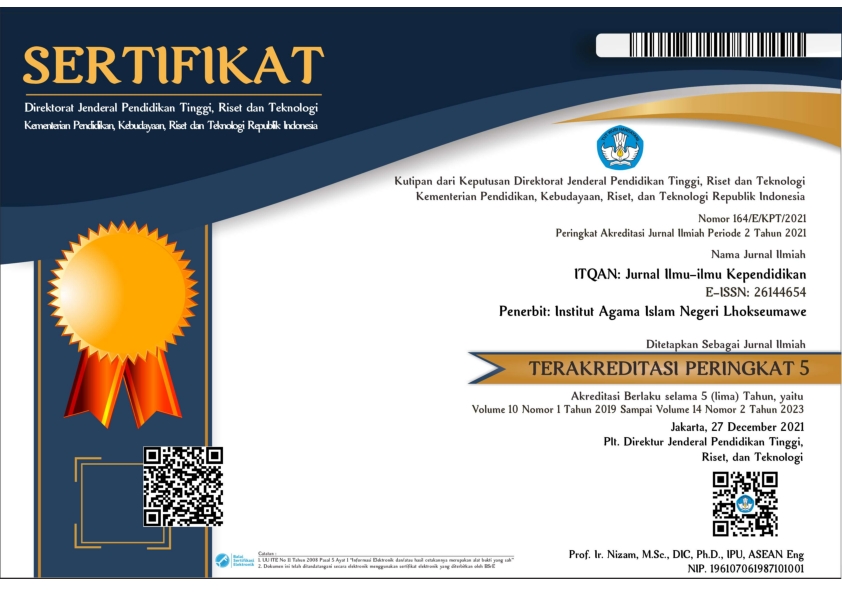Pengaruh Pembelajaran Daring di Masa Covid 19 terhadap Motivasi Belajar Siswa Kelas X SMK TIK-MM Swasta Rakyat Sei Glugur
Main Article Content
Rahmadani Fitri Ginting
Harun Lubis
Ciptasari Br Ginting
Tirta Yogi Aulia
Online learning is an electronic learning system, using electronic media, internet, computer, gedget (HP), and multimedia files (sound, pictures and video). Learning motivation is the overall driving force in the student that moves the student and gives rise to the learning activity so that the desired goal of the learning subject can be achieved. This research is quantitative research that examines phenomena objectively by using statistical calculations to test hypotheses in research. The sample of this study amounted to 30 people with total sampling technique. The test result of product moment r value is positive 0.632 and perolehan p count = 0.000 < 0.05 which indicates that online learning variables (variable X) and learning motivation variable (variable Y) have a significant influence. Anova regression analysis test obtained an F value of 18,628 and a sig value. That is 0.000 < 0.05, so it can be concluded that Ha was accepted and Ho rejected. The result of the determinant coefficient, known determinant cofisien value of 0.399 which means variable X (Online Learning) affects variable Y (Learning Motivation) by 39.9%.
Alifa, F. N. (2020). Tantangan Pelaksanaan Kebijakan Belajar dari Rumah dalam Masa Darurat Covid-19. Pusat Penelitian Badan Keahlian DPR RI, 7(7), 13–18.
Hughes, B. A., Stallard, J., & West, C. C. (2020). The Use of WhatsappⓇ as a Way to Deliver Plastic Surgery Teaching During the COVID-19 Pandemic. Journal of Plastic, Reconstructive & Aesthetic Surgery, 73(7), e1–e2. https://doi.org/10.1016/j.bjps.2020.05.034
Islam, S., Baharun, H., Muali, C., Ghufron, M. I., & Marzuki, I. (2018). To Boost Students ’ Motivation and Achievement through Blended Learning To Boost Students ’ Motivation and Achievement through Blended Learning. Journal of Physics: Conf. Series, 1114, 1–11.
Louis, K. S., Murphy, J., & Smylie, M. (2016). Caring Leadership in Schools. Educational Administration Quarterly, 52(2), 310–348. https://doi.org/10.1177/0013161X15627678
Prasetyo, M. A. M., Bashori, B., & Lailisna, N. N. (2020). Strategy of Boarding School (Pesantren) Education in Dealing With the Covid-19 Pandemic. Khalifa: Journal of Islamic Education, 4(2), 142–160.
Ratnasari, E. D., Saputra, N., & Rahmana, F. (2021). The Effect of Online Learning Technology on Learning Effectiveness. 2021 International Conference on Information Management and Technology (ICIMTech), 702–705. https://doi.org/10.1109/ICIMTech53080.2021.9535093
Reiss, M. J. (2020). Science Education in the Light of COVID-19. Science & Education, 29(4), 1079–1092.
Susilawati, S., & Supriyatno, T. (2020). Online Learning through WhatsApp Group in Improving Learning Motivation in the Era and Post Pandemic COVID-19. Jurnal Pendidikan: Teori, Penelitian, Dan Pengembangan, 5(6), 852–859.
Afnibar, & Fajhriani, D. (2020, Januari). Pemanfaatan Whatsapp Sebagai Media Komunikasi Antara Dosen dan Mahasiswa dalam Menunjang Kegiatan Belajar (Studi terhadap Mahasiswa UIN Imam Bonjol Padang). Al Munir, Jurnal Komunikasi dan Penyiaran Islam, 11(1), 70-83.
Arikunto, S. (2010). Prosedur Peneltian, Suatu Pendekatan Praktik. Jakarta: Rineka Cipta.
Bilfaqih, Y., & Qomarudin, N. (2015). Esensi Pengembangan Pembelajaran Daring Panduan Berstandar Pengembangan Pembelajaran. Yogyakarta: Deepublish.
Cahyani, L. L. (2020, 07 31). Motivasi Belajar Siswa SMA pada Pembelajaran Daring di Masa Pandemi Covid-19. Jurnal Pendidikan Islam, 3(1), 123-140.
Daryanto. (2013). Inovasi Pembelajaran Efektif. Bandung: Yrama Widya.
Djamarah, B. S. (2011). Psikologi Belajar Edisi Revisi. Jakarta: Rineka Cipta.
Mustofa, M. I., Chordzirin, M., & Sayekti, L. (2019). Formulasi Model Perkuliahan Daring sebagai Upaya Menekan Disparitas Kualitas Perguruan Tinggi (Studi terhadap Website pditt.kemdikbud.go.id. Walisongo Journal of Informastion Technology, 1(2), 151-160.
Rusman. (2012). Model-model Pembelajaran, Mengembangakan Profesionalisme Guru. Jakarta: Rajawali Perss.
Sadirman. (2011). Interaksi dan Motivasi Belajar Mengajar. Jakarta: Rajawali Perss.
Sugiyono. (2009). Metode Penelitian Pendidikan, Pendekatan Kuantitatif, Kualitatif, dan R&D. Bandung: Alfabeta.
Syah, M. (2015). Psikologi Pendidikan, dengan Pendekatan Baru. Bandung: Rosdakarya.



